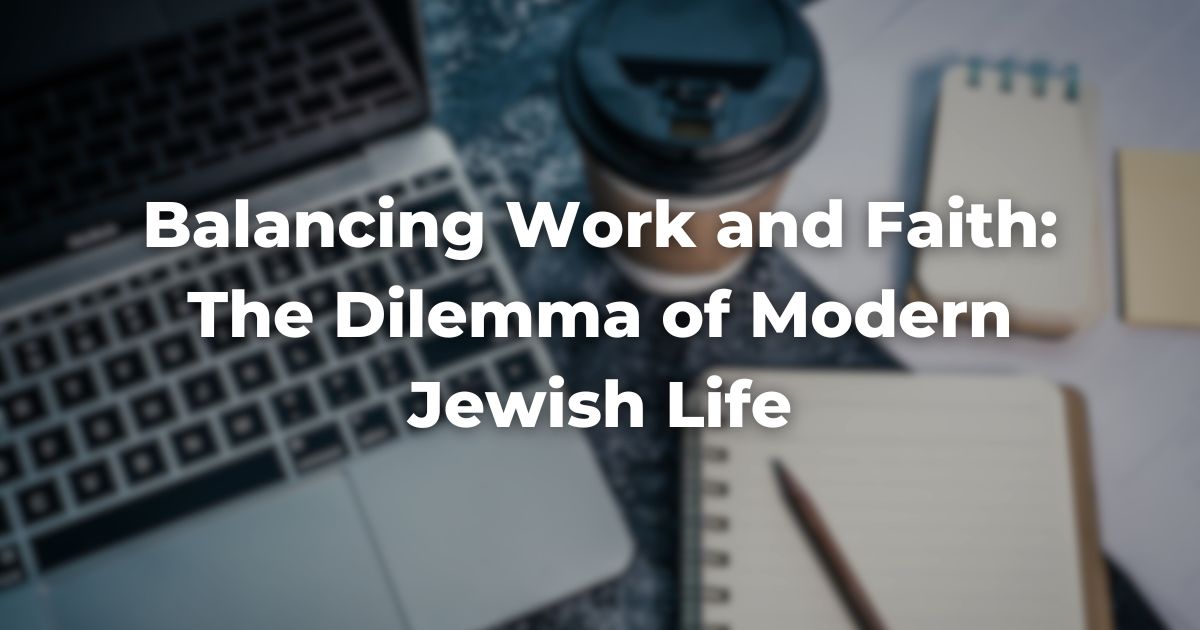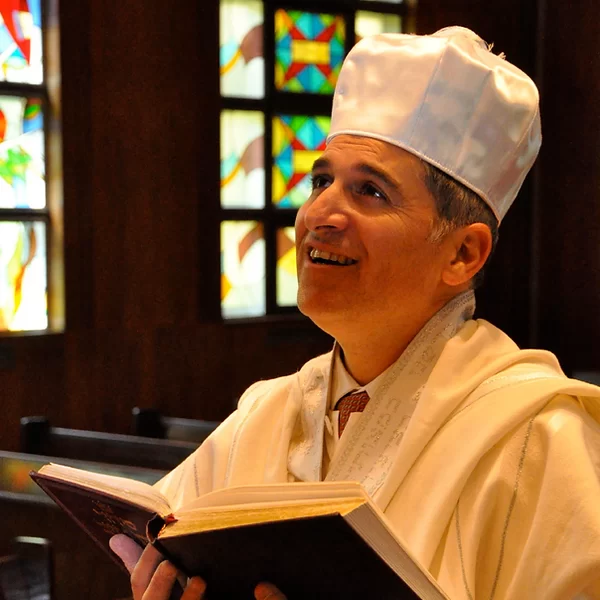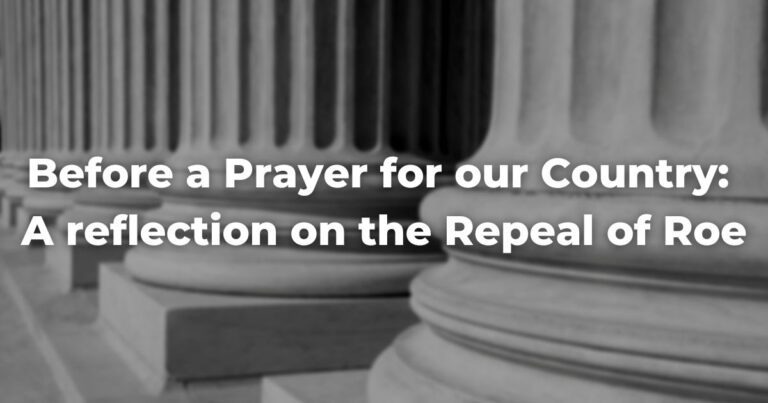The halachah (Jewish law) prohibits particular labors on Shabbat and certain holidays (Exodus, 20:7-10), considered sacred times set aside for rest and spiritual renewal. For Jews, these laws are divine commandments that define our identity.
The intersection of work and faith raises fundamental questions: not only about what we’re willing to sacrifice for Judaism, but how we can transform our approach to work to protect our religious practices. The tension between parnasah (livelihood) and Kedushah (holiness) often forces difficult decisions, particularly when work demands conflict with the observance of Shabbat and Jewish holidays.
How far might we be willing to go to preserve our connection to Judaism in the face of modern work pressures?
This dilemma isn’t just theoretical – it affects our real lives, forcing us to make compromises that challenge the balance between career advancement and spiritual fulfillment.
For many Jews, the weekly cycle revolves around balancing professional commitments with the sacred observance of Shabbat. However, the demands of modern work environments can make this balance difficult. The fast-paced nature of corporate life, the expectation of always being “on,” and the pressure to meet deadlines often make it nearly impossible to disconnect from work during Shabbat or holidays fully.
This challenge is especially pronounced for those in professions that require shift work, such as healthcare, retail, or hospitality. These careers, while providing necessary services to society, often require workers to violate religious observances. The inability to leave work during Shabbat or a holiday can feel like a deep conflict, as employees are faced with choosing between financial stability and their religious obligations.
A Story of Compromise
Take the example of Miriam, a nurse who works in a hospital over Shabbat.
Miriam, a deeply devout woman, has always prioritized her Judaism. She lights candles every Friday night and recites the prayers with her family. However, as a nurse in a busy hospital, she was scheduled to work on Shabbat more frequently as she advanced in her career.
In the beginning, she tried to avoid these shifts, explaining to her supervisors that she couldn’t work on Shabbat. But with rising patient numbers and an understaffed department, her supervisors made it clear that her refusal to work during these times was problematic.
Faced with mounting financial pressures and the realization that her colleagues would pick up the extra shifts, Miriam reluctantly agreed to work on Shabbat. The compromise, however, came at a cost.
She found herself missing family meals, feeling distant from her community, and questioning whether she was truly living according to her Jewish values. Despite her internal conflict, she rationalized that she was still fulfilling her role as a caretaker and that this work, too, could be seen as a mitzvah.
Miriam’s experience is not isolated. Many Jews working in fields with irregular hours face similar compromises. For some, the choice between observing Jewish law and maintaining a steady income can seem impassable, leading to a gradual erosion of religious practices. These compromises have consequences and they can create tension between family and congregation commitments and between the work’s demanding pressure.
The Dilemma is Everywhere
While this dilemma might be universal, for Jews, the stakes can feel particularly high. Our tradition doesn’t simply speak to how we live our private lives; it exists in every aspect of our existence, including work. We have to consider before choosing a working place many aspects’ like – the schedule of the job, dress codes (tzniut), even being alone in a room with someone of another gender (yihud).
On one hand, The TalmudReferring to one of two collections, the Jerusalem and Babylonian Talmuds, edited in the 6th century, that contains hundreds of years of commentary, discussion, and exploration of the ideas in the Mishnah. One could describe it as Mishnah + Gemara = Talmud Read more teaches that a person’s livelihood for the year is a blessing coming from God (Beitzah 16a). On the other hand, how can one accept that blessing when it requires sacrificing the very essence of religious life?
Thus, when individuals are forced to choose between work and religious observance, they are often faced with a challenging dilemma: whether to maintain their faith or risk professional advancement. This dilemma happens especially in times of financial crises or wars – when poverty increases to the matter of survival.
Some congregants in my synagogue confessed to me that their parents had to go to work on Shabbat and Yom Tov during the times of depression in the 1930s in order to survive and the ability “to put the bread on the table”…
The Struggle for Balance
The struggle to maintain a balance between work and Judaism is a profound challenge in modern society. Work is a necessity for survival and financial stability and Judaism calls for a deep and meaningful connection to God, which requires time for rest, prayer, and reflection.
Ultimately, the way one navigates this struggle is highly personal. Some may choose to find a career that aligns more closely with their religious values, while others may make compromises to meet their professional obligations. What remains consistently true, is the recognition that this balance is not static; it requires constant reevaluation and adjustment.
When we decided to return to Israel, after six years in Canada, we had no jobs waiting for us in Israel and needed to search for any possible source of income. However, for us, working on Shabbat and Yom Tov was never even a consideration. While we took almost any job we could find, we never compromised our religious values and family time on these holy days. And you know what? We managed to survive just fine.
The decision to keep Shabbat or Jewish holidays or not for the sake of work is not an easy one, and it often comes with profound emotional and spiritual costs. Yet, in our complex world, the line between work and religious observance is not always clear-cut. Ultimately, the question is not just about how much we are willing to sacrifice for the sake of Judaism, but also about how we can redefine our relationship with work in a way that allows us to preserve our faith. Each individual must confront this question in their own way, but the ongoing effort to find this balance is itself an important part of living a meaningful Jewish life.
Through thoughtful choices, self-reflection, and a commitment to growth, we can navigate the delicate dance between our professional obligations and our spiritual practices, understanding that sometimes the journey itself is the most important part of the process.
Author
-

Born in Jerusalem (1965), Boaz Davidoff is a cantor, musician, and rabbinical student living between Israel and Montreal. He was a fellow in the first cohort of the Exploring Judaism's Writer's Fellowship. He serves as cantor at Montreal's Shaarezedek Synagogue and teaches Bar-Mitzvah, voice, and guitar in Israel. Boaz performs concerts solo and with his band across Israel. Currently in his final year of rabbinic studies at Jerusalem's Schechter Institute, he occasionally substitutes as rabbi in Montreal. Married with three children, Boaz is passionate about Israel, organizing charity concerts and events to support the country. He combines his musical talents with religious leadership, bridging communities in Canada and Israel.
View all posts






